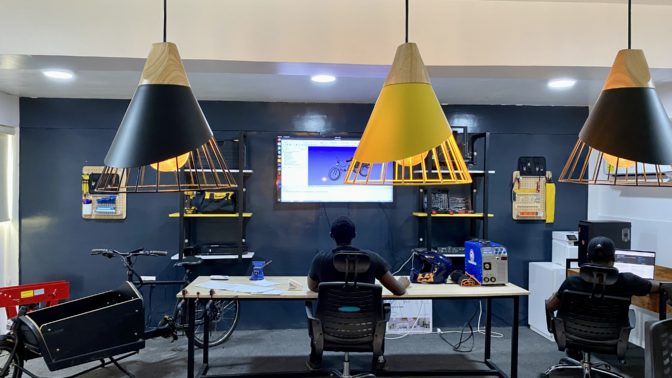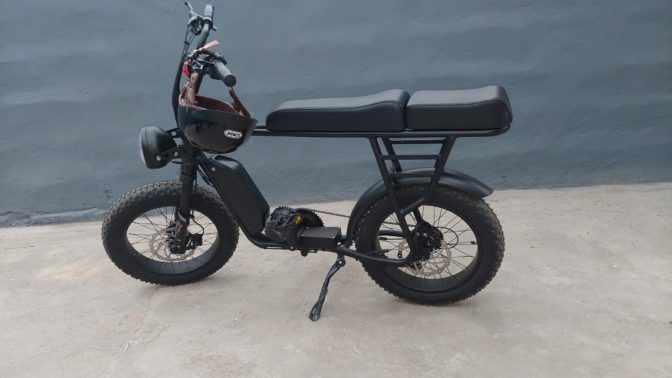eMobility in Ghana – sustainable systems for a nation in need
Ghana’s transport sector is the main source of greenhouse gas emissions and air pollutants, both significant contributors to climate change in the region. Ghanaians, especially socio-economically marginalized populations, need low-emission transport technologies that, in turn, support an ecosystem of green growth, new skilled jobs, and a circular economy. In order to support change that fundamentally works in the region, local voices, insights, and partnerships are a necessity. In collaboration with Impact Hub Accra – part of a global network of 100 hubs built on the principles of locally rooted solutions & globally connected communities – Siemens Stiftung is working with local social enterprises to establish meaningful change.
In this blog post, we speak with Valerie Labi, CEO of Cargo Bikes Africa, and Sebastian Gruss from Siemens Stiftung about the Electric Cargo Bikes “Made in Ghana” project to learn more about its purpose, hurdles, and potential impact for Ghanaians.

Siemens Stiftung: What are the primary objectives for the Electric Cargo Bikes “Made in Ghana” program?
Sebastian: The Electric Cargo Bikes “Made in Ghana” program, funded by the International Climate Initiative, has three primary objectives. First, to test a business model for e-cargo bikes that fits the mobility needs of the Ghanaian people while looking into a sustainable and local value chain for producing, operating, and maintaining 50 electric cargo bikes. Next, to build appropriate charging infrastructure for such bikes, a network of photovoltaic (PV) charging stations will be established in close cooperation with existing PV operators and local government institutions, with a sustainable financing model being tested. Lastly, to establish an electric mobility platform to bring together relevant stakeholders with their ongoing efforts towards e-mobility solutions in the region.

Siemens Stiftung: Valerie, your social enterprise, Cargo Bikes Africa, is supporting Impact Hub in the Electric Cargo Bikes “Made in Ghana” project. What outcomes and progress have you seen thus far? And what long-term initiatives do you hope to implement moving forward?
Valerie: Everyone at Cargo Bikes Africa is passionate about helping people get around. We want to improve our communities and help keep the planet healthy. We believe that electric cargo bikes will be a significant contributor to Africa’s transition towards green mobility. One of the critical pillars enabling the market to leapfrog and embrace e-mobility is dependent on building local capabilities to produce electric vehicles. The “Made in Ghana” e-cargo bike project is leading the way as the first example of designing, manufacturing, and assembling an electric bike in totality on the continent.
Our critical outcomes so far:
- We have completed a six-month period of human-centered design research. This started with understanding the market opportunity for e-cargo bikes across Ghana. We spoke to hundreds of Ghanaians about how they move, how much they spend, what they like and dislike about their current modes of transport, what they want mobility solutions to feature, and at what price point do they want it. This gave us the design principles not just of the vehicle, but also of the business model, brand, and key stakeholders who have a role to play in the enabling environment.
- The second outcome for us has been learnings about the supply chain. We now have a clear understanding of both global and local value chains needed to build a domestic e-bike. We have established contracts for different inputs, testing desirability, reliability, quality, and feasibility of sourcing these parts in an affordable manner for our own prototype design.
- An important element of the whole project was understanding the different uses for electric cargo bikes. We have had the opportunity to test different use cases, starting with delivery, but we are now pivoting to also understand commuting and sharing models of distribution.
Moving forward, we just completed our first domestic designed frame, and will be looking to start prototype production by August 2022.

Siemens Stiftung: Why is this e-mobility program especially important for Ghana? How will it support the local economy, transportation system, and environment?
Sebastian: In Ghana, population growth, urbanization, and economic development have been expanding and have resulted in high traffic volumes that are contributing to an increase in greenhouse gas emissions and air pollutants. To address these realities, the Government of Ghana has set out goals to reduce national CO2 emissions by 15% by 2030. And it is for these reasons that the mobility sector demonstrates great potential to reduce CO2 emissions in Ghana by electrifying the means of transport.
The “Made in Ghana” program will be implemented in partnership with Impact Hub Accra in cooperation with local stakeholders and social enterprises to integrate e-cargo bikes into existing transport systems. While using a social entrepreneurial approach, the project strives to act as a multiplier both locally and in nearby African countries. The project is also establishing local value chains for the production and operation of e-cargo bikes by taking circular economy aspects into account. The creation of solar-powered charging stations, green jobs, and technical training in the sector of e-mobility are additional objectives of the project.
Siemens Stiftung: How do you envision e-cargo bikes and e-mobility platforms benefiting Ghanaian communities and people now and in the future?
Valerie: The three biggest problems that Ghanaians have with regards to mobility are that rising fuel prices are making everything expensive, there is a lot of pollution coming from old imported ICE cars and motorbikes, and that the emergence of e-commerce platforms is causes there to be more vehicles on the road to meet the needs of on-demand delivery. E-cargo bikes and e-mobility platforms will mitigate these issues as there is no need for fuel.
Alternative energy generation such as solar- or hydro-powered grids can be cleaner ways to fuel mobility. The emergence of battery swap systems is also mitigating range anxiety, supporting e-micro-mobility solutions such as e-bikes and e-scooters for longer travel without the stress of charging. Cargo bikes is committed to offering a subscription model through its digital platforms, starting with our website. This is an important step in e-mobility as it is improving the accessibility of getting an e-bike by removing the burden of ownership and reducing the capital requirements for getting mobile. We believe that this will open up the market to both rural and urban communities. In addition to this, Cargo Bikes Africa is pioneering an employee cycle scheme, enabling companies to register for people to be able to pay for their e-bike subscriptions through their payroll. We believe particularly in secondary cities and peri-urban communities, e-cargo bikes will become a preferred mode of transport to work and to run errands around town.
We have two versions of our e-bikes and are currently piloting an e-trike. The AYA is our flagship e-bike for delivery and it will take you where you want to go. Inspired by the Ghanaian Adinkra symbol meaning endurance and resourcefulness. The Zurura bike is perfect for commuting in a quick, easy, and affordable way. It means “to wonder” or “to roam around” in Swahili.
The Electric Cargo Bikes “Made in Ghana” project has been made possible in partnership with Impact Hub Accra thanks to the support from the Federal Ministry for the Environment, Nature Conservation and Nuclear Safety (BMU).